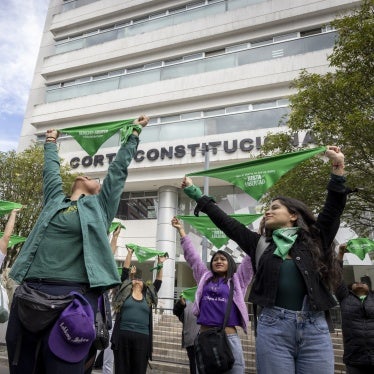Labor Day? Let's be real. The last thing on our minds this weekend is labor rights. Whether we're fortunate enough to have a job or worrying about how to get one in today's economy, we'll focus more on this summer's last hurrah than on the Tuesday- morning-after travails.
But whether we're on vacation, getting ourselves or family members ready to go back to school, or commuting back to work, there is a group of workers who keep all these pieces of our collective lives together and who deserve much more recognition and attention to their needs. The domestic workers who clean houses, cook meals, do endless loads of laundry, run errands and provide care for children and the elderly are often on call around the clock, paid a pittance for their services and protected far too little by labor laws.
Remember Nannygate? In the last 20 years, the US media have given a lot of coverage to the cases of prominent public figures who hire domestic workers without documents, from Zoe Baird during the Clinton administration to Nancy Killefer during the Obama administration. Some legislative reform has followed, but the debate continues to focus on employers -- and the political repercussions for them of these clandestine arrangements. There has been little attention to improving the lot of domestic workers, who are caught up in the storm of controversy and then just as quickly forgotten.
Domestic workers' rights are an issue not just for the US, but for many nations. The International Labor Organization found gaps in labor laws around the world and is proposing a new international treaty to raise the standards for a group of workers systematically excluded from protections that have been granted to other employees. The Obama administration has signaled an interest in workers' rights and a willingness to reach out internationally. U.S. leadership on this issue could be very helpful.
Human Rights Watch research has documented the abuses domestic workers face in many countries. We recently looked into the problem in Guatemala. There, the combination of poverty, poor access to education, lack of opportunities, and persistent racial and gender discrimination propel many girls and women to pursue domestic work, often migrating from rural, indigenous areas to urban centers.
Guatemala's estimated160,000 domestic workers do not enjoy the same legal protections as the country's other workers. Employers are not required to pay domestic workers the 52 quetzales ($7) minimum daily wage that a daycare worker or school janitor is guaranteed, for example, nor to limit their hours or provide overtime pay.
Domestic workers in Guatemala are routinely denied the time off, sick leave, and full social security that other workers get. They may be subjected to sexual harassment and assault, and verbal, psychological and physical violence, but labor inspectors are prohibited from investigating these work-related complaints in private homes. Never mind the powerful lessons of the domestic violence movement in general, which highlighted governments' responsibility to protect people not only on the street but also in private homes. In labor disputes, the word of the isolated domestic worker is often pitted against that of her wealthier and better-connected employer.
Guatemala is starting to pay attention to the problem, though. Sandra de Colóm, the wife of President Alvaro Colóm, has publicly announced that domestic workers are one of her top priorities. This summer, she and the Guatemalan Social Security Institute began a pilot project to provide basic health and accident coverage to domestic workers. It is a good first step, but still not equivalent to protection afforded other workers.
The problems faced by Guatemala's domestic workers is a familiar story all around the world. Discussions around the proposed ILO convention address equal labor protections for domestic workers, with special considerations for children and migrants, explicit employment agreements and monitoring mechanisms, and measures to protect domestic workers from physical, sexual and psychological violence and harassment.
So, yes, let's enjoy the beaches, pools and barbecues this Labor Day weekend. But now that September is here, and Congress and school are back in session, it is time to put our house in order and put discussions about domestic workers' human rights where they belong: on the table--not under the table.
The Obama administration has the opportunity to help strengthen international protections for millions of girls and women around the world employed as domestic workers. It should take the lead toward supporting and adopting this convention.







